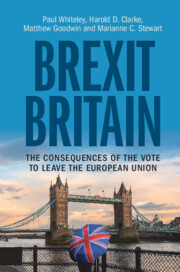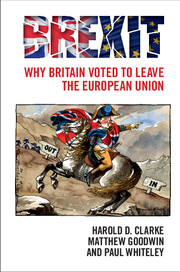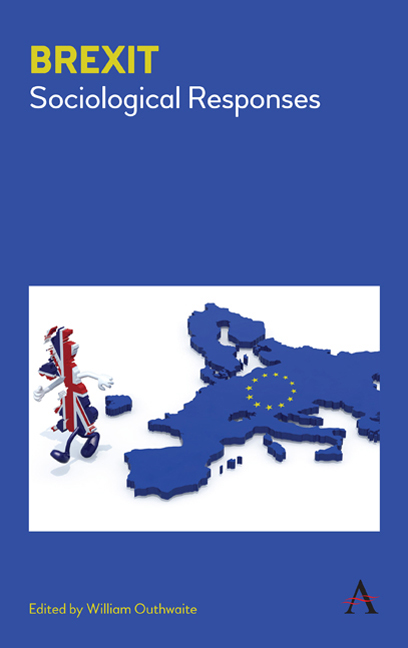Refine search
Actions for selected content:
21152 results for Brexit Britain
Title match

Brexit Britain
- The Consequences of the Vote to Leave the European Union
-
- Published online:
- 25 April 2023
- Print publication:
- 04 May 2023
1 - Welcome to Brexit Britain
- from Part I - The Short Term
-
- Book:
- Brexit Britain
- Published online:
- 25 April 2023
- Print publication:
- 04 May 2023, pp 3-23
-
- Chapter
- Export citation
10 - Brexit Britain, Covid Britain
- from Part III - The Future
-
- Book:
- Brexit Britain
- Published online:
- 25 April 2023
- Print publication:
- 04 May 2023, pp 278-308
-
- Chapter
- Export citation
11 - Defining Brexit, Redefining Britain
- from Part III - Time for Brexit
-
- Book:
- Brexit Time
- Published online:
- 22 June 2017
- Print publication:
- 08 June 2017, pp 139-150
-
- Chapter
- Export citation
Citizenship, Migration and Free Movement in Brexit Britain
-
- Journal:
- German Law Journal / Volume 17 / Issue S1 / 01 July 2016
- Published online by Cambridge University Press:
- 06 March 2019, pp. 99-104
-
- Article
-
- You have access
- Export citation
1 - What does Britain want from Brexit?
-
- Book:
- Squaring the Circle on Brexit
- Published by:
- Bristol University Press
- Published online:
- 21 April 2023
- Print publication:
- 16 May 2018, pp 1-26
-
- Chapter
- Export citation
Challenges for Immigration Policy in Post-Brexit Britain: Introduction
-
- Journal:
- National Institute Economic Review / Volume 248 / May 2019
- Published online by Cambridge University Press:
- 01 January 2020, pp. R1-R4
- Print publication:
- May 2019
-
- Article
- Export citation
How Divided Is Britain? Symbolic Boundaries and Social Cohesion in Post-Brexit Britain
-
- Journal:
- PS: Political Science & Politics / Volume 56 / Issue 4 / October 2023
- Published online by Cambridge University Press:
- 10 August 2023, pp. 553-559
- Print publication:
- October 2023
-
- Article
-
- You have access
- Open access
- HTML
- Export citation

Europe and the Decline of Social Democracy in Britain: From Attlee to Brexit
-
- Published by:
- Boydell & Brewer
- Published online:
- 24 October 2019
- Print publication:
- 20 September 2019
Cue Brexit: Performing Global Britain at the UN Security Council
-
- Journal:
- European Journal of International Security / Volume 9 / Issue 1 / February 2024
- Published online by Cambridge University Press:
- 17 October 2023, pp. 122-140
-
- Article
- Export citation
UK economic outlook: Brexit Britain in Covid recovery ward
-
- Journal:
- National Institute Economic Review / Volume 255 / February 2021
- Published online by Cambridge University Press:
- 05 March 2021, e1
- Print publication:
- February 2021
-
- Article
-
- You have access
- Export citation
Intergenerational social mobility and the Brexit vote: How social origins and destinations divide Britain
-
- Journal:
- European Journal of Political Research / Volume 62 / Issue 2 / May 2023
- Published online by Cambridge University Press:
- 02 January 2026, pp. 612-632
-
- Article
-
- You have access
- Open access
- HTML
- Export citation
1 - From Adam Smith to Brexit: The Rise, Fall, and Revival of Free Trade in Britain, 1776–2016
-
-
- Book:
- British Imperialism and Globalization, c. 1650-1960
- Published by:
- Boydell & Brewer
- Published online:
- 26 May 2022
- Print publication:
- 14 January 2022, pp 25-50
-
- Chapter
- Export citation
16 - ‘Prince Harry has gone over to the dark side’: Race, Royalty and US–UK Romance in Brexit Britain
-
-
- Book:
- Love Across the Atlantic
- Published by:
- Edinburgh University Press
- Published online:
- 22 September 2020
- Print publication:
- 02 April 2020, pp 275-290
-
- Chapter
- Export citation
Stuart Ward and Astrid Rasch, eds. Embers of Empire in Brexit Britain. London: Bloomsbury Academic, 2019. Pp. 183. $26.95 (paper).
-
- Journal:
- Journal of British Studies / Volume 59 / Issue 1 / January 2020
- Published online by Cambridge University Press:
- 17 January 2020, pp. 212-213
-
- Article
- Export citation

Brexit
- Why Britain Voted to Leave the European Union
-
- Published online:
- 27 April 2017
- Print publication:
- 20 April 2017
6 - Brexit
-
- Book:
- The Lies We Were Told
- Published by:
- Bristol University Press
- Published online:
- 14 April 2023
- Print publication:
- 07 November 2018, pp 162-180
-
- Chapter
- Export citation

Brexit
- Sociological Responses
-
- Published by:
- Anthem Press
- Published online:
- 10 January 2018
- Print publication:
- 02 January 2017
10 - Brexit
-
- Book:
- European Union Law
- Published online:
- 28 November 2019
- Print publication:
- 12 September 2019, pp 406-465
-
- Chapter
- Export citation
6 - Brexit
-
- Book:
- Competition Law in Crisis
- Published online:
- 04 August 2022
- Print publication:
- 18 August 2022, pp 163-194
-
- Chapter
- Export citation
